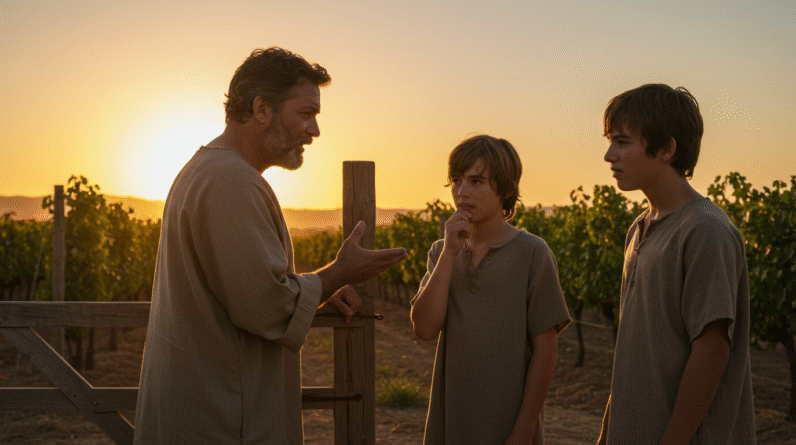The Parable of the Unforgiving Servant: Embracing Forgiveness with Fresh Insights
Forgiveness, like a breath of fresh air for the soul, isn’t always easy to embrace. Yet, through the timeless tales found in religious texts, we are often given guidance on this profound human endeavor. One such story is the Parable of the Unforgiving Servant, a narrative that invites us to look deeper into our capacity for forgiveness. Let’s dive into this parable with fresh eyes and uncover new insights that may help us embrace the power of forgiveness in our own lives.
Introduction
Imagine a world where everyone forgave as freely as they breathed. Conflicts would dissolve, relationships would mend, and a profound sense of peace would flourish. This idyllic vision, though challenging to achieve, isn’t out of reach. It begins with stories like the Parable of the Unforgiving Servant, an age-old tale that continues to be relevant in guiding us on the path of forgiveness. But what does this story really teach us, and how can it significantly impact our approach to forgiveness? Let’s explore.
Bible Reference
📖 Key Verse:
The parable is found in Matthew 18:21-35. This passage captures a conversation between Peter and Jesus, where Peter questions the boundaries of forgiveness. Jesus responds with a narrative that vividly illustrates the importance—and expectation—of forgiveness.
Understanding the Parable
The Master and the Debtor
The story unfolds with a servant in relentless debt. Imagine owing someone millions, something you’d be working your whole life to repay—sounds insurmountable, right? Yet, when the servant begs for patience, the master, unexpectedly, forgives the entire debt (Matthew 18:27). It’s a radical act of grace that metaphorically illustrates divine mercy. But this extravagant forgiveness comes with an expectation—one that carries a significant message about the contagion of compassion.

The Unforgiving Reaction
Enter the twist in the tale. This newly liberated servant, instead of passing on the grace he received, confronts a fellow servant who owes him a meager sum. You’d think he’d show a little compassion after his own miraculous release. Instead, he demands payment and, forgetting the mercy shown to him, has his debtor thrown into prison (Matthew 18:28-30). It’s both shocking and revealing. The story provides a mirror reflecting our tendencies to receive forgiveness without mirroring it in our actions toward others.
The Master’s Response
When the master learns of the servant’s harshness, his response is swift and just. This part of the narrative may leave you reflecting: why is reciprocity such a crucial part of forgiveness? The master revokes his mercy, serving as a stern warning that forgiveness is meant to transform how we treat others (Matthew 18:32-34). The parable concludes with a sobering reminder from Jesus that our forgiveness is intertwined with our ability to forgive others (Matthew 18:35).
The Ripple Effect of Forgiveness
Creating a Culture of Forgiveness
Why is forgiveness so influential in transforming personal relationships and communities? Each act of forgiveness sets off ripples that can lead to waves of change, breaking cycles of anger and bitterness. By forgiving, we not only release others from indebtedness but also free ourselves from the emotional chains of resentment. Starting with small acts, forgiveness can weave its way through entire communities, creating a culture of compassion. Just imagine the ripple effect you could start by forgiving someone today.
Empowering Your Narrative
Let’s flip the script for a moment. What happens when you choose to forgive, against all odds? This act becomes part of your own redemption narrative. It shapes you. It empowers you. Forgiveness isn’t just a gift you give to others; it’s a transformation you invite into your own life. The parable encourages us to identify moments when we are the unforgiving servant and challenges us to choose the path of grace instead.
Practical Steps to Embrace Forgiveness
You might wonder, how can you start tangibly practicing forgiveness? Here are some practical steps inspired by the parable:
- Reflect on Past Forgiveness: Recall a time when you received forgiveness. Let it inspire your acts of mercy.
- Empathize with Others: Put yourself in others’ shoes. Understanding breeds compassion.
- Release the Debt: Metaphorically tear up any emotional debts held against someone. It might be the most freeing act you’ll ever undertake.
Conclusion
The Parable of the Unforgiving Servant isn’t just a story; it’s a call to action. It teaches us that genuine forgiveness isn’t just a personal choice—it’s a transformative force with the power to change lives and communities. As we reflect on this timeless lesson, let’s challenge ourselves to move beyond receiving forgiveness to actively extending it to others. Imagine the peace and harmony that could ensue.
🔍 Explore More Bible Insights:
✅ 1. The Role of Eliab – David’s Brother in His Journey to Facing Goliath
Tone: Relational, reflective, character-focused
🔹 “Family Tensions and God’s Purpose – Discover the Connection”
Read it here.»
✅ 2. What Jeremiah 29:11 Means for Us Today
Tone: Hopeful, encouraging, life application
🔹 “God’s Plans Still Stand – Find Your Hope Here”
Read it here.»
✅ 3. The Wise and Foolish Builders – A Strong Foundation in Faith (Matthew 7:24-27)
Tone: Foundational, practical, discipleship
🔹 “Build Your Life on the Rock – Keep Learning”
Read it here.»
✅ 4. The Roman Centurion at the Cross – A Moment of Revelation
Tone: Awe-inspiring, redemptive, gospel-centered
🔹 “From Witness to Believer – Read His Revelation”
Read it here.»
As a ClickBank Affiliate, I earn from qualifying purchases.
Acknowledgment: All Bible verses referenced in this article were accessed via Bible Gateway (or Bible Hub).
“Want to explore more? Check out our latest post on Why Jesus? and discover the life-changing truth of the Gospel!”








